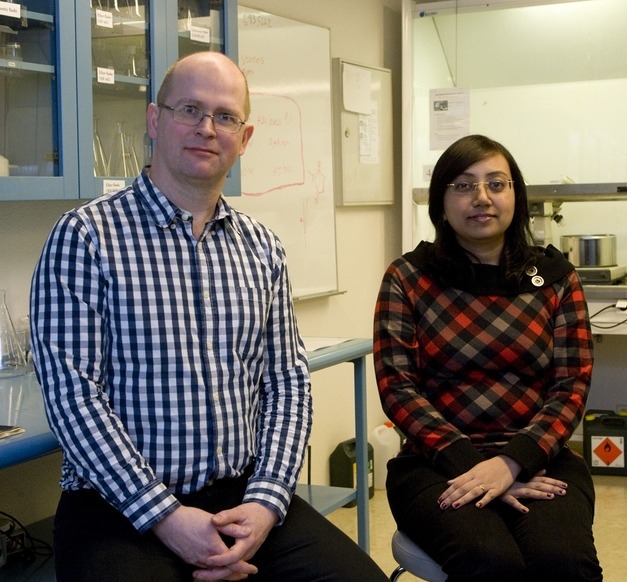The Faculty of Pharmaceutical Sciences has received reinforcement in the form of highly capable Indian students recently. Priyanka Sahariah is part of this group of doctoral students. Sahariah was born in 1978 in India and holds a MS diploma in Organic Chemistry. “I am very interested in Medicinal Chemistry and would very much like to work on research in that field. With that in mind I applied for doctoral studies at the Faculty of Pharmaceutical Sciences at the University of Iceland. I am also interested in research on the use of so-called chitosan derivatives in nanopharmaceuticals,” says Sahariah who has settled well in in Iceland and works on her research in Hagi in Reykjavík.
“Chitosan is a special polysaccharide that is derived from shrimp shell. Derivatives from this polysaccharide can be defined as nano-materials as they are larger than conventional pharmaceutical ingredients, even though they are very small. Thus it is possible to use these materials so that certain components are functional against microbes whereas others are used for drug delivery,” says Már Másson, Professor at the Faculty of Pharmaceutical Sciences and Sahariah’s supervisor.
“I plan to create chitosan derivatives mimicking antimicrobial peptides and research possible use of these new materials in medicine and disinfection,” says Sahariah.
Anti-microbial peptides are a part of the human body’s defences against infection. Pharmaceutical ingredients that are based on their characteristics may become useful in the future as broad-spectrum antibiotics. It is becoming increasingly urgent to find new broad-spectrum antibiotics to replace the traditional ones, thus counteracting anti-microbial immunity.
“The chemical characteristics of peptides are, however, not very suitable as peptides are extremely fragile. Special enzymes in the body cause them to break down, they can also cause resistance as well as being costly in production,” says Másson. “The focus has therefore shifted to developing simpler materials that are easier to produce, such as Chitosan derivatives. They have the advantage of breaking down into a biochemical substance that is harmless to the body; despite being more stable that the peptides. These biochemical substances are in fact identical to those present in the body,” says Másson.
Sahariah says that she and Másson have been successful in developing new chitosan derivatives that contain radicals that are very similar to those characteristic of anti-microbial peptides. “I have demonstrated that the functionality of these materials against microbes that are known to create diseases in humans. I have achieved this in collaboration with Martha Á. Hjálmarsdóttir, Assistant Professor in Biomedical Sciences. We will continue and develop more derivatives with multi-purpose construction. The idea is to develop substances that are very active against microbes but have simultaneously very little toxic effects in human cells. This material can be used to treat complex infections as microbes are unlikely to become immune to it. This could also be used for disinfection of medical equipment.



